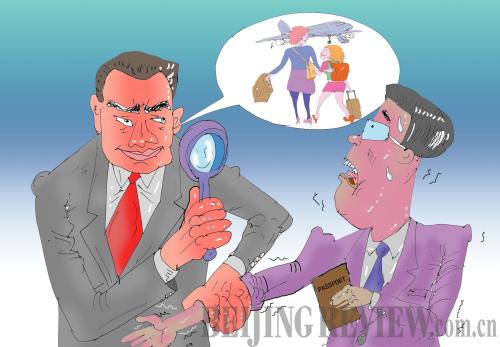|
 |
|
(LI SHIGONG) |
Luo guan (government officials who remain in China when their spouses and children have emigrated) is a new term in Chinese society. In recent years, some officials have actively helped children and spouses to obtain permanent resident status overseas for study or business purposes while they stayed behind.
On November 25, the government of Shenzhen City, southern Guangdong Province, promulgated a new regulation banning luo guan from assuming top leadership posts in the government.
While supervision of luo guan has become an important part of central and local government anti-corruption efforts, Shenzhen's regulation is the first of its kind to directly ban these officials from certain leadership posts.
A study by Peking University says more than 10,000 corrupt Chinese officials have fled to North America and Europe during the past decade, taking with them a total of more than 650 billion yuan ($95.6 billion) in illegal income. Many of these officials had remained in China after having sent relatives and assets abroad following the commission of crimes. When their criminal activities were in danger of being discovered, the unencumbered bureaucrats also fled the country before the police took actions against them.
Recently, this phenomenon has become a hot topic among netizens. Many who want the government to produce new regulations to prevent corrupt officials from damaging public interests support Shenzhen's new policy as it is tailored to China's current situation. They also believe that, although the policy will not completely root out corruption, it offers a new anti-corruption approach, which will be improved by further legislation.
But other people oppose judging officials' integrity on the basis of if they are luo guan or not. These people believe that suspicion of all luo guan would be unfair. Moreover, even if they are forbidden from taking primary leadership roles, corrupt luo guan could still exchange power for personal gain. Thus, the Shenzhen policy would not halt the trend. These people suggest that instead of monitoring luo guan, government should allow officials to remain and require them to publish information about their assets, spouses and children. Therefore, government supervision of officials could be assisted by public and media scrutiny.
Must become mandatory
Wu Hangmin (Sichuan Daily): Once government officials, especially senior officials, seek permanent resident status abroad for their families, their intention to stay in China no matter what will be questioned, gives people the reason to question their integrity.
Even more open to question is how these officials paid the exorbitant costs of their spouses and children settling abroad. If all these officials are that wealthy, it is likely they have taken bribes. Therefore, it is only natural that these officials would one day take refuge overseas, posing a daunting challenge to China's anti-graft efforts. Since these officials' families live abroad, they could make decisions in favor of those adopted countries at the cost of China's interests.
Therefore, the policy of banning luo guan from primary leadership posts should be extended and implemented throughout the whole country.
Shu Xinping (Legal Daily): Officials whose spouses and children have settled abroad could be considered unpredictable.
Thus Shenzhen's policy of keeping luo guan out of top leadership posts is timely, and builds a firewall helping to prevent graft. The ban will restrain the power of luo guan and lower the risk of corruption cases.
I believe that against the backdrop of the anti-corruption situation in China, local governments should explore various means to prevent graft. Limiting the power of luo guan could prove effective in stopping graft, and it is a measure that should be put in place across the country.
Zhang Jingwei (Chutian Metropolis Daily): Not every luo guan is corrupt, but they are a high-risk group. For one thing, it is hard for them to explain how and why their spouses and children emigrated. For another, once their corruption is exposed, it is easy for them to escape.
As a matter of fact, monitoring the risks involved in the use of power is a common practice in all countries. In modern societies, even officials with clean records could face major career obstacles once it is revealed their spouses and children have emigrated.
Despite possible shortcomings, checking on the power of luo guan could be an effective measure to curb corruption.
Lu Kaisheng (www.fjsen.com): It is widely acceptable for citizens to settle abroad, become nationals of another country or seek permanent resident status overseas because of their need to study, do business or live with their families. But such decisions by government officials and their families are open to criticism by the people.
| 